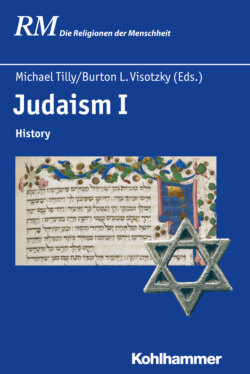Читать книгу Judaism I - Группа авторов - Страница 43
На сайте Литреса книга снята с продажи.
1 The Hellenization of Ancient Judaism—Preliminary Notes
ОглавлениеThe Hellenization of ancient Judaism was a process that took place over a long period of time, from the beginning of the 4th century onwards, and largely without conflict, until a crisis situation came to a dramatic climax in the time of Antiochus IV Epiphanes (175–164 BCE) (2 Macc 4:13), leading to resistance and revolt. At this point the practice of Jewish religion in Jerusalem seemed in doubt. Hellenismos is a polemical term coined in 2 Maccabees (2:13) as a counterpart to the term Ioudaismos (2 Macc 2:21; 8:1; 14:38). The fight for the uniqueness of the God of Israel and his worship in Jerusalem, called the »Maccabean War,« did not lead to a general suppression of Hellenistic education, culture, technology, and way of life. The Maccabean/Hasmonean rulers were Hellenistic High priests, and from 103 BCE also Hellenistic kings. It was only in their minting of coins that they took account of the prohibition of human iconography.2
The narrow focus on the few years between 167 and 164 BCE and the recovery of the Temple of Jerusalem as the exclusive place of worship of the God of Israel is rightly countered with the point that, as the Dead Sea scrolls show, Judaism in the 3rd to 1st centuries BCE was occupied with other matters than confrontation with Hellenism.3 Other contentious issues included the calendar and the points mentioned in 4QMMT. »So we have to say that no Qumran text certainly deals with the events under Antiochus IV, nor does any Qumran text show signs of a confrontation between Judaism and Hellenism.«4 This means, however, that a Hellenization had already taken place from the late Persian or early Hellenistic period onwards and also that in many areas it was accepted without conflict. Hengel is even able to show this for Qumran and the community of the yahad. 5
